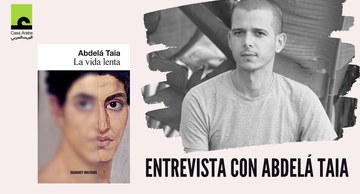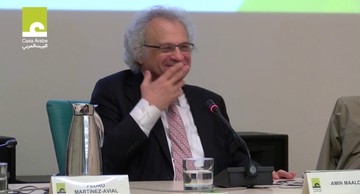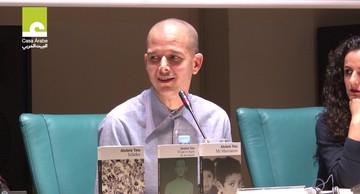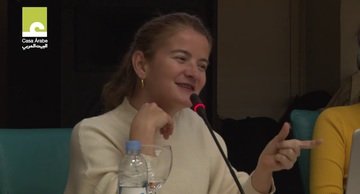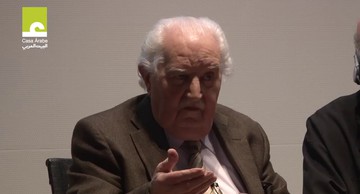

Al-Tanki, in the Footsteps of an Iraqi Woman (ARABIC)
Published at 16 26,,, 22 2022
ALL VIDEOS IN THIS CATEGORY
-
Entrevista con el escritor marroquí Abdelá Taia
Coincidiendo con la puesta a la venta en librerías de su última novela, "La vida lenta", editada por Cabaret Voltaire, dialogamos con el escritor marroquí Abdelá Taia. La entrevista, en inglés con una síntesis consecutiva en español, podrá verse el miércoles 10 de junio en el canal de Casa Árabe en Youtube a partir de las 18 horas. En la Francia posterior a los atentados de 2015, Munir, parisino homosexual de 40 años de origen marroquí, vive en situación de precariedad. Acaba de mudarse a un apartamento de la Rue de Turenne, en un barrio burgués de la capital. Su vecina octogenaria es Madame Marty, quien logra sobrevivir a duras penas en una minúscula buhardilla. La amistad entre estos dos excluidos de la República va creciendo hasta el día en que se transforma en una pesadilla. Los enfrentamientos se encadenan. Un día, Madame Marty, fuera de sí, llama a la policía para que detengan a Munir. Abdelá Taia (Salé, 1973). Escritor marroquí en lengua francesa. Tras cursar estudios de Literatura en la Universidad Mohamed V de Rabat, se establece en 1998 en París donde comienza su carrera literaria. Hasta el momento ha publicado, entre otros textos, nueve novelas: "Mi Marruecos" (Cabaret Voltaire, 2009, premio Cálamo), "Le Rouge du tarbouche", "El Ejército de Salvación", "Una melancolía árabe", "El día del rey", "Infieles" (Cabaret Voltaire, 2014), "Un pays pour mourir," "El que es digno de ser amado" (Cabaret Voltaire, 2018) y "La vida lenta". Siempre atento a la actualidad política marroquí y del mundo árabe, colabora habitualmente en la prensa francesa e internacional con artículos de opinión. En 2012 dirige su primer largometraje, "El Ejército de Salvación", basado en su novela homónima. Actualmente reside en París. Más información: https://www.casaarabe.es/eventos-arabes/show/entrevista-con-abdela-taiaPublished at 49 10,,, 20 2020 -
Encuentro con el escritor Amin Maalouf en Casa Árabe (FRANCÉS)
Casa Árabe y Alianza Editorial organizaron este evento el miércoles 23 de octubre de 2019 en Madrid, con motivo de la publicación de "El naufragio de las civilizaciones". En el encuentro, el escritor Amin Maalouf dialogó con el periodista de El País Guillermo Altares. El acto fue presentado por Pedro Martínez-Avial, director general de Casa Árabe. El evento se retransmitió en directo en nuestro canal de Youtube. Hace unos años, Amin Maalouf nos hablaba de que "nuestras civilizaciones se agotan" en "El desajuste del mundo" y en" Identidades asesinas", y aportaba las razones: la desconfianza hacia el "Otro", la xenofobia, la intolerancia política y religiosa, el populismo, el individualismo y la insolidaridad del nacionalismo, el racismo... Hoy en día ya nos habla directamente de "naufragio inminente". No hay añoranza de un pasado mejor en sus palabras, solo le preocupa el futuro de esta "época desconcertante", el porvenir de las nuevas generaciones, que pueda desaparecer lo que ha dado sentido a la aventura humana. Tampoco se deja llevar por el pesimismo ni quiere predicar el desaliento, solo hace una llamada lúcida a la responsabilidad colectiva, dejando entreabierta la puerta de la esperanza a que el mundo vuelva a orientarse, ya que como escribió en su novela "Los desorientados": "Más vale equivocarse en la esperanza que acertar en la desesperación". Amin Maalouf (Beirut, 1949) nace en el seno de una familia árabe cristiana y, siguiendo una larga tradición familiar, se dedica inicialmente al periodismo en el diario libanés "An Nahar", en algunos casos como corresponsal de guerra. En 1975, tras el estallido de la guerra civil libanesa, Maalouf se exilia a Francia, donde vive con su familia desde entonces. Con la publicación de su ensayo "Las Cruzadas vistas por los árabes" en 1983, decide dedicarse a la escritura (ensayo y novela, principalmente). La mayoría de los libros de Maalouf se desarrollan en un entorno histórico y en ellos combina hechos reales con fantasía y conceptos filosóficos. Sus textos, escritos con la habilidad de un auténtico maestro de la narración, ofrecen una visión refinada y sensible de los valores y actitudes de las diferentes culturas de Oriente Medio, África y el mundo mediterráneo. Maalouf ha recibido el premio Maison de Presse por su novela "Samarcanda" y el Goncourt por "La roca de Tanios". Ambas fueron publicadas por Alianza Editorial en 1989 y 1994, respectivamente, junto al resto de su obra: "León el Africano" (1989), "Las cruzadas vistas por los árabes" (1989), "Los jardines de Luz" (1991), "El primer siglo después de Beatrice" (1993), "Las escalas de Levante" (1997), "Identidades asesinas" (1999), "El viaje de Baldassare" (2000), "El amor de lejos" (2002), "Orígenes" (2004), "El desajuste del mundo" (2009) y "Los desorientados" (2012). En 2010 obtuvo el Premio Príncipe de Asturias de las Letras y es miembro de la Academia Francesa. Sus textos han sido traducidos a más de veinte idiomas. http://www.casaarabe.es/eventos-arabes/show/encuentro-con-amin-maaloufPublished at 30 30,,, 19 2019 -
“He Who Is Worthy of Love” , by Abdellah Taïa (FRENCH VERSION)
January 31, 2019. Casa Árabe, Cabaret Voltaire and Kif-Kif, Migraciones y Refugio LGBTI+ have organized the presentation of this book by Moroccan author Abdellah Taïa. Taking part in the meeting with the author were Samir Bargachi, president of Kifkif, Migraciones y Refugio LGBTI+. The event was presented by Karim Hauser, Casa Árabe’s International Politics Coordinator. Ahmed is 40 years old, lives in Paris and is Moroccan. He writes to his mother, who passed away five years ago, to deal with topics that have remained unresolved, and finally to tell her that he is homosexual. He sends a letter to break up with Emmanuel, the man he loves passionately, the man who took him to France and changed his life, though not for the better in every way. Ahmed also receives letters from Vincent and Lahbib. An epistolary novel that harks back in time to the origins of all that pain. A book on French colonialism that endures in the young Moroccan’s love life. The book’s presentation will delve into such topics as sexuality, colonialism and identity as a Moroccan LGBTI+ individual. Abdellah Taïa will visit Casa Árabe thanks to the collaboration of Fundación Tres Culturas. Abdellah Taïa (Salé, 1973) is a Moroccan writer and filmmaker who has been living in Paris since 1998. Through his father, a concierge at a local Rabat library, he comes into contact with literature and studies French Literature in Rabat. He gets the opportunity to leave Morocco in the mid-1990s when he studies abroad for one semester in Geneva. He later studies at the Sorbonne in Paris. In 2006, he made his sexual orientation public in an interview with the political magazine Tel Quel, becoming the first Moroccan intellectual to do so in that way. Taïa’s books don’t just deal with his life as a gay man in a homophobic environment, but also perform reflection over an autobiographical background showing the social experiences of the generation of Moroccans who grew up in the 1980s and 1990s. More info: http://en.casaarabe.es/event/“he-who-is-worthy-of-love”Published at 06 14,,, 19 2019 -
“Yogurt with Marmalade: Or how my mother became Lebanese” (ARABIC)
2018.26.11. Lebanon’s Lena Mehrej presented her graphic novel, published by Ediciones del Oriente y del Mediterráneo, at the Casa Árabe headquarters in Madrid. She held a dialogue with graphic novelist Quan Zhou, author of Sweet-and-sour Gazpacho. "In Lebanon, yogurt has been eaten with salt and grated cucumber (very finely grated) since the beginning of time. One day, Lena Merhej (Beirut, 1977) was stunned when she saw her mother eat yogurt with marmalade. Years later, she sketched this lovely story about her mother, a German woman from Hannover, and created a portrait of the peaceful co-existence of contradictions” that existed in her family and, perhaps to a lesser extent, her country. A closer look at the Arab world through the eyes of a women from old Europe, proving that the East is not so far and also has a memory, nostalgia and open wounds." Alfonso Zapico, Babelia - El País, April 21, 2018 Lena Merhej (Beirut, 1977), born to a German mother and Lebanese father, completed her studies in Art and Graphic Design. She has given classes in illustration and animation at the Lebanese American University. With more than twenty illustrated albums for children, she formed part of the founding team of Samandal, the first magazine of comics in the Arab world. Her animated film Dessiner la guerre (Drawing War) won the jury’s award at the New York Festival in 2003, and her graphic novels Kamen sine (Another Year) and Yogurt with Marmalade received the award for best comic book at the International Comics Festival of Algiers in 2009 and 2013, respectively. In 2016, she coordinated the monographic issue of Samandal on youth, sexuality and poetry. More info: http://en.casaarabe.es/event/“yogurt-with-marmalade-or-how-my-mother-became-lebanese”Published at 35 05,,, 18 2018 -
Prodigios: An anthology of Arabic poems (FRENCH)
04.20.2018. Casa Árabe joined the celebrations of Book Night 2018 (La Noche de los Libros) with the presentation of this work illustrated by Rachid Koraïchi. The event included talks by Koraïchi, a calligrapher and one of the finest visual artists today, and Pedro Martínez Montávez, an Arabist, translator and professor emeritus of the Universidad Autónoma de Madrid. Presented by Pedro Martínez-Avial, the General Director of Casa Árabe. This anthology contains Arabic poems written from the sixth century to the modern day, the most notable of which include both classical and contemporary poets. Created with the voices of 5 poets, some of whom have never been translated into Spanish until today, the edition combines poetry from the Arab world in general, Al-Andalus and Algeria with illustrations by Koraïchi, thereby joining two paths of creativity: image and word. On the evening of the presentation, Rachid Koraïchi spoke to us about these surprising and inspiring illustrations. Along with Arabist Pedro Martínez Montávez, who coordinated this edition, we traveled through the book, capturing the essence of a culture in which poetry is, has been and will remain a meeting point and a pathway that opens up new horizons. More info: http://en.casaarabe.es/event/prodigios-an-anthology-of-arabic-poemsPublished at 46 26,,, 18 2018

